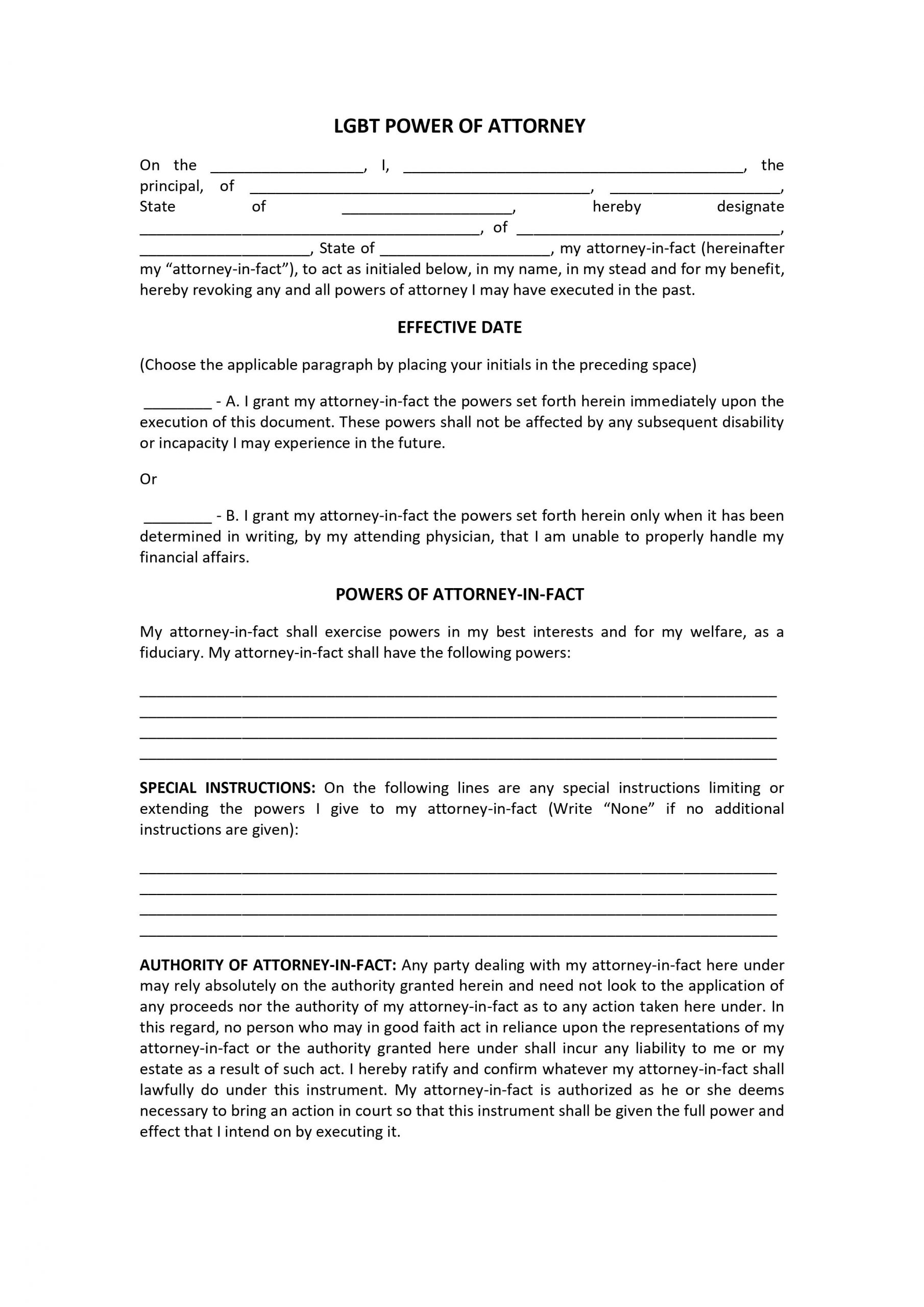- Eviction Notice Forms
- Power of Attorney Forms Forms
- Bill of Sale (Purchase Agreement) Forms
- Lease Agreement Forms
- Rental Application Forms
- Living Will Forms Forms
- Recommendation Letters Forms
- Resignation Letters Forms
- Release of Liability Agreement Forms
- Promissory Note Forms
- LLC Operating Agreement Forms
- Deed of Sale Forms
- Consent Form Forms
- Support Affidavit Forms
- Paternity Affidavit Forms
- Marital Affidavit Forms
- Financial Affidavit Forms
- Residential Affidavit Forms
- Affidavit of Identity Forms
- Affidavit of Title Forms
- Employment Affidavit Forms
- Affidavit of Loss Forms
- Gift Affidavit Forms
- Small Estate Affidavit Forms
- Service Affidavit Forms
- Heirship Affidavit Forms
- Survivorship Affidavit Forms
- Desistance Affidavit Forms
- Discrepancy Affidavit Forms
- Guardianship Affidavit Forms
- Undertaking Affidavit Forms
- General Affidavit Forms
- Affidavit of Death Forms
LGBT Power of Attorney
The circumstances of the modern world drive people to adapt to change. Even legal references were adjusted to fit the decade-long fight for gender inclusivity and understand the fluidity of gender expression. This breakthrough is existent through an LGBT power of attorney form which acknowledges an individual’s sexual preference while allowing them to appoint someone to stand in their place. Gradually, the stereotypes based on actual biological sex are changing. Find out more about the importance of LGBT Power of Attorney form and how to complete one in this article. Read More
What Is an LGBT Power of Attorney Form?
An LGBT power of attorney—also known as POA—is a document that preserves the right to appoint someone on behalf legally, or instead of the principal (the person who signed the POA). There are several reasons for an individual’s absence or inability to make crucial decisions. It could be an injury, mental condition, or all of the above. With an LGBT POA, the principal can appoint their same-sex partner or legal spouse as an agent to take actions with authorized capacity. Also, it gives the agent the power and authority to do anything, as long as the POA allows it.
How Do You Craft an LGBT Power of Attorney Form in Four Easy Steps?
An individual’s gender identity does not deny him or her the right to make critical decisions. However, scheduled or unplanned absence does. In that case, a principal can use an LGBT POA to outline the actions that should be taken relative to medical care, finances, property, or the signing of legal documents. Also, it helps protect the principal’s interest by authorizing an agent to make individual decisions. For other concerns, you can define the limit of the document liberally. Hence, here are a few tips and steps in creating a working POA:
1. Understand Your Needs
There are various types of power of attorney documents. That is why you should understand your needs so that you can choose wisely. You can use an LGBT power of attorney to appoint your same-sex partner to be your representative if you are incapacitated or injured. This document ensures you can have someone to act as your replacement and protect your rights by making important decisions on your behalf.
2. Choose Your Agent
Choosing an agent, also known as the attorney-in-fact, is crucial for LGBT POA. Your partner is predetermined to be your agent. However, it could also be the person you trust—who could enhance the POA’s interest. Some cases require an alternative agent(s) if the first one could not perform the responsibilities.
Then, collate your agent’s details, which may entail their names, contact details, and e-mail address. And, include these into the form. Asking for these details has many benefits. One of these is to identify the participation of another person.
3. Define the Limit of Authority
Your legal decisions should be up to you unless you allow other people to do so. As principal, decide on this while you can make crucial decisions. A person or their family is not legally allowed to create a power of attorney while that person is incapacitated. However, you can limit the actions of your agent to a certain level. Either they will be authorized to make indefinite or limited decisions. But, your agent can revoke their participation if they decide to discontinue.
4. Sign the Power of Attorney
Sign the LGBT POA with the presence of two witnesses, notary public, or both. The signing of the POA should correspond with the state law where the document is held. Some states only require either a witness or a notary public. After that, the POA is eligible to be used. It is important as well to review before signing the document. This will help you clear out your decisions. You can make revisions to your LGBT POA if necessary.
Frequently Asked Questions
Does a power of attorney have to be notarized?
Yes. Notarizing a power of attorney ensures that the signatures are authentic, which omits fraud. It only requires the presence of the principal with the notary public for the POA to be notarized.
What should I do if my agent lives in another state?
A power of attorney must be tailored to the state where the principal resides. Make sure that the agent is available in times they are needed, such as signing the POA.
When do you use a power of attorney?
Often, a power of attorney is used for financial and healthcare purposes. However, if you want to grant specific authority in your absence, you can use the limited/special power of attorney.
This world and its society do not give us guarantees. That is why it is essential to plan for the future. This way, we can protect ourselves and our hard-earned assets. In a changing world, a power of attorney is critical in making you feel legally secured.
